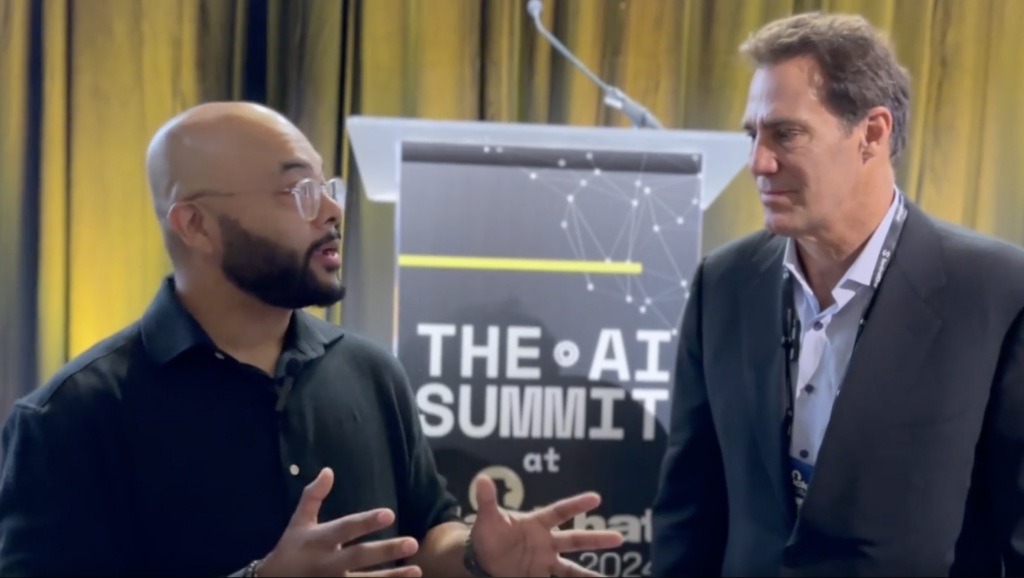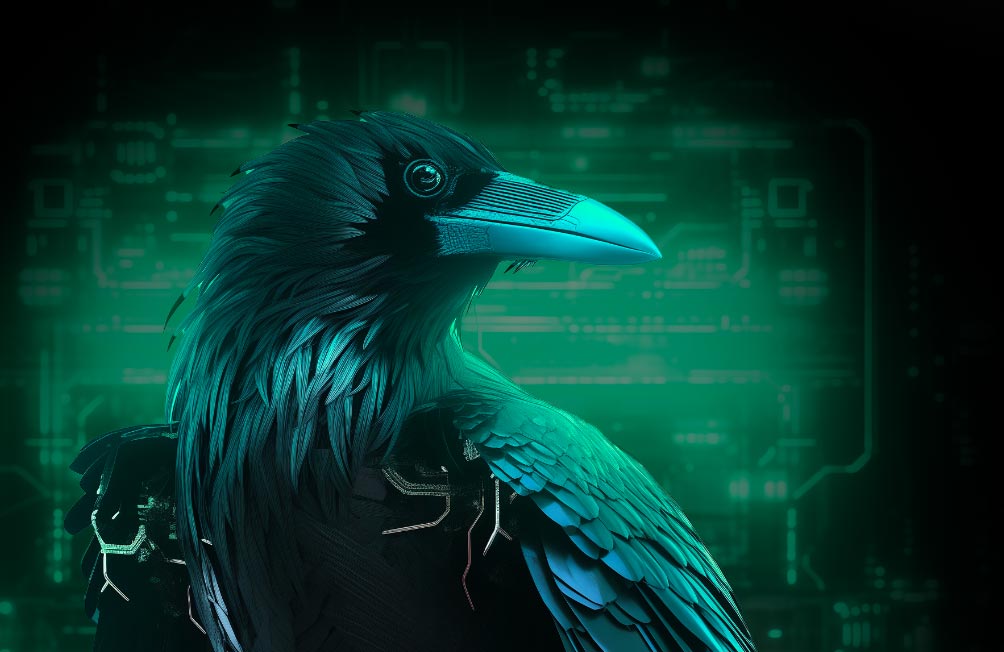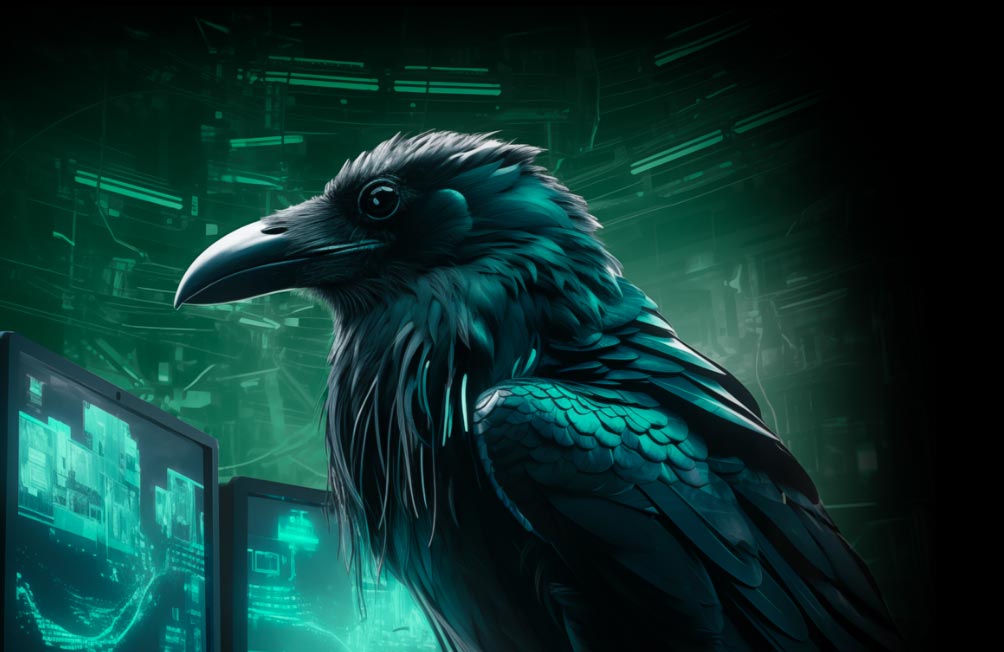AI and Cybersecurity Converge at Black Hat: NightDragon’s Dave DeWalt Interviews Blackbird.AI’s Wasim Khaled
Industry experts warn of an emerging AI arms race in cybersecurity, where malicious actors weaponize the same technologies that enhance threat detection and prevention to create sophisticated narrative attacks.

The convergence of AI and cybersecurity is a new threat vector for security leaders. The intersection was center stage at the AI Summit at the Black Hat cybersecurity conference, where industry security leaders gathered to examine emerging technology and its implications for global security.
Dave DeWalt, NightDragon CEO and founder and Blackbird.AI Advisory Board Chairman interviewed Blackbird.AI co-founder and CEO Wassim Khaled about narrative attacks. In exclusive interviews for NightVision, a special edition broadcast live from Black Hat, Khaled and DeWalt shared their insights into the evolving landscape of AI and security.
WATCH: Dave DeWalt Interviews Wasim Khaled
“The convergence of AI and security is happening faster than many anticipated,” Khaled explained. “At Blackbird.AI, we’re witnessing firsthand how AI reshapes the security paradigm. It’s not just about defending against traditional cyber threats anymore; we’re entering an era where AI can be both a powerful ally and a formidable adversary.”
DeWalt echoed Khaled’s sentiment and emphasizing AI’s transformative potential. “We’re at an inflection point in cybersecurity,” DeWalt stated. AI is not just another tool in our arsenal; it’s fundamentally changing the game. The companies that can effectively harness AI will be the ones that define the future of our industry.”
Blackbird.AI, founded in 2014 by Khaled and CTO Naushad UzZaman, specializes in using artificial intelligence to detect and counter digital threats, mainly misinformation and digital manipulation. The company’s approach exemplifies the innovative potential at the intersection of AI and security, using advanced algorithms to sift through vast amounts of online data and identify patterns indicative of coordinated narrative attack campaigns.
DeWalt, known for his strategic insights, highlighted the dual nature of AI in security. “AI offers us unprecedented capabilities for threat detection and response,” he noted. “But it’s a double-edged sword. The same technology that allows us to build more robust defenses can also be used to create more sophisticated attacks. It’s an arms race, and we need to stay ahead.”
The introduction of the AI summit at Black Hat this year is a testament to the industry’s recognition of AI’s dual nature in the security landscape. On one hand, AI offers unprecedented capabilities for threat detection, predictive analysis, and automated response to security incidents. Machine learning algorithms can process and analyze data at scales far beyond human capacity, potentially identifying threats before they materialize.
However, the same power that makes AI an invaluable tool for security professionals also makes it a potent weapon for malicious actors. As Khaled pointed out, “We’re seeing an arms race develop in the AI space. As we develop more sophisticated AI-driven security measures, bad actors also harness AI to create more complex and harder-to-detect threats.”
LEARN MORE: What Is Narrative Intelligence?
This was a recurring theme throughout the conference. Presentations and workshops explored topics ranging from AI-powered penetration testing tools to machine learning in developing more resilient encryption methods. Concurrently, there were sobering discussions about the potential for AI to generate highly convincing deepfakes, automate social engineering attacks, and even create self-modifying malware.
DeWalt emphasized the need for a proactive approach in this new landscape. “We can’t just react to threats anymore,” he asserted. “With AI, we can predict and prevent attacks before they happen. But this requires a fundamental shift in how we approach security – from a reactive stance to a proactive, AI-driven strategy.”
The presence of companies like Blackbird.AI. at Black Hat underscores a growing trend in the cybersecurity industry: the need for specialized expertise in AI and machine learning. Traditional security firms are rapidly expanding their AI capabilities through internal development or strategic acquisitions. This shift is driven by the recognition that future security challenges will increasingly involve AI components, requiring a new set of skills and approaches to address effectively.
“The security landscape is evolving at an unprecedented pace,” Khaled noted. “Five years ago, the idea of AI-generated narrative attack campaigns at scale seemed like science fiction. Today, it’s a reality we’re actively combating. The next five years will likely bring challenges we can barely imagine now.”
DeWalt added a note of cautious optimism: “Despite the challenges, I’m excited about the future of our industry. AI gives us tools we’ve never had before. Yes, it creates new risks, but it also opens up possibilities for security that were unthinkable just a few years ago. Our job is to harness that potential responsibly.”
This evolution presents both opportunities and challenges for the cybersecurity community. On the opportunity side, AI promises to enhance defensive capabilities significantly. Automated systems can monitor networks 24/7, detecting anomalies and responding to threats in real time. Machine learning algorithms can adapt to new attacks, potentially staying one step ahead of cybercriminals.
However, the challenges are significant. As AI systems become more integrated into critical infrastructure and decision-making processes, they also become high-value targets for attackers. AI makes it easier for agenda-driven actors to attach narrative attacks to cyber attacks.
“Why do they do this? Because hijacking the high visibility thing is the easy way to recontextualize the narrative for ideological harm or financial gain,” said Khaled. “They’re very, very skillful and clever at doing this, particularly using the newer, low cost easy-entry AI products in the generative AI space.”
Moreover, democratizing AI technology means that sophisticated tools, once available only to nation-states or large corporations, are now accessible to a broader range of actors. This democratization lowers the barrier to entry for cybercrime, potentially leading to an increase in the frequency and sophistication of attacks.
The discussions at Black Hat also touched on the ethical implications of AI in security. Questions were raised about privacy, surveillance, and the potential for AI-driven security measures to be misused for oppressive purposes. These ethical considerations are becoming increasingly important as AI systems gain more autonomy and influence over security decisions.
“We must consider the ethical implications of what we’re building,” Khaled emphasized. “AI in security isn’t just a technical challenge – it’s a societal one. We must ensure that our AI systems are effective, aligned with our values, and respectful of individual privacy.”
DeWalt concurred, adding, “The companies that will lead in this new era won’t just be the ones with the best technology. They’ll be the ones that can balance innovation with responsibility and build powerful AI systems while maintaining public trust.”
As the AI Summit wrapped up, there was a palpable sense that the cybersecurity industry stands at a crossroads. Integrating AI into security practices is inevitable, but the form of this integration—and its implications for privacy, freedom, and global security—remains to be determined.
Wasim Khaled, Dave DeWalt, and the myriad of innovators and thought leaders at Black Hat represent the vanguard of this ongoing transformation. As companies continue to innovate and events like Black Hat’s AI summit foster crucial dialogues, the cybersecurity community is working to shape a future where AI enhances security without compromising the values it seeks to protect.
The message at Black Hat is clear: the future of security is inextricably linked with the future of AI. As these domains continue to converge, they will undoubtedly bring unprecedented challenges and remarkable opportunities. Security professionals, policymakers, and technologists must navigate this new landscape thoughtfully, balancing innovation with responsibility and security with ethics.
“We’re not just securing systems anymore,” said Khaled, “we’re securing the future of AI itself.” DeWalt added a call to action: “The next decade will define the relationship between AI and security. We must ensure that this relationship makes the digital world safer, not more dangerous.”
To learn more about how Blackbird.AI can help you with election integrity, book a demo.
Need help protecting your organization?
Book a demo today to learn more about Blackbird.AI.



